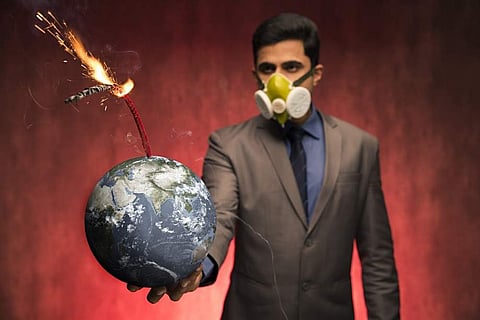

Earthquakes, storms, floods and droughts pose a threat to the population throughout the world – and they are increasing in numbers. So, there is an urgent need for people who know what to do in an emergency. Disaster management studies prepare students for this work. Experts estimate that nine out of ten disasters are caused by climate change. According to the United Nation’s International Strategy for Disaster Reduction (ISDR), more than 2.2 million people around the world have been killed in natural disasters since 1975. Two thirds of the victims and the damage caused were the results of storms, floods, droughts and other meteorological phenomena.
The demand for disaster managers is growing in parallel to the number of natural disasters and crises. Disaster preparedness and disaster management or crisis management belong together but require quite different skills. In different courses, students learn how to cope with the after-effects of humanitarian crises and natural disasters as disaster managers. They learn how to draw up emergency plans, coordinate assignments and set up a crisis team. The aim of this training is to raise awareness about the challenges the job holds, create global networks and formulate international standards for disaster management. Studies combine content from the natural sciences and the arts, including logistics, medicine, politics, anthropology, psychology, structural knowledge, practical orientation and risk analysis methods.
In India and in many other countries, there is a whole range of courses leading to either a bachelor’s or a master’s degree. Each university has its own focus. Areas focused on include Safety and Hazard Defence, Disaster Management and Risk Governance. Natural Hazards and Risks in Structural Engineering is also gaining importance as students get to learn about the devastating effects of earthquakes, tsunamis, floods and storms on buildings and infrastructure. The course aims at disaster preparedness, teaching students important and necessary points for the construction of new buildings, such as: emergency planning procedures, hazards, risks and disasters, technological development, environmental and sustainable development, law and management fundamentals, political, international and social issues, roles of key agencies, relief coordination and planning, field skills disaster theory, statistics and logistics, disaster mitigation, preparedness and response, Earth catastrophes, fire and explosion, physical, psychological and social reconstruction of disaster-affected communities.
Disaster preparedness and disaster management require a wide variety of skills. In addition to the expertise acquired at university, key requirements include assertiveness, decisiveness and political sensitivity. In the private sector, for banks, companies, research institutes and state governments, most project-related work offers two options: People either work directly in the field, or they coordinate assistance from an office. And although the cause of disaster management is very dramatic, it is certainly a very interesting degree in a professional environment that will always be dynamic and that is primarily about helping people.
(Hari Balaji hails from Chennai, India and is an alumnus of the Swiss Hotel Management School, Switzerland and Sri Ramachandra University, India. He has served as a consultant and master trainer for UNICEF and UNFPA in different parts of India. He regularly conducts orientation programmes and workshops in India’s premium institutions including IIT Madras. As a State Manager for flood response and coordination, he has coordinated rescue and relief efforts with various local, state, national and global agencies. In recognition of his contribution during the Tamil Nadu Floods 2015, he received the ‘Bhale Bharath Award of Excellence’ by the Indian Science Monitor. He is certified by the World Health Organisation (WHO) for ‘Emergency Risk Management’ as a Master Trainer for Minimum Initial Services Package (MISP) for Sexual and Reproductive Health during Disasters by UNFPA.)
